Despite childhood obesity being a global challenge, wins have been almost non-existent when it comes to pushing it back. However, Brighton, a city in England has experienced a downward trend in childhood obesity rates compared to national figures. This beautiful study gives us some insight as to how their multi-faceted approach including things like checking physical activity and schoolmeals, provision of higher quantities of fresh vegetables, raising awareness about sugar in food using a concept called ‘Sugar smart’ and incorporating all of these into school meals. Furthermore, several of the identified actions and ways of working in Brighton are also reflected in recent food systems policy recommendations to deliver healthier diets for all, particularly concerning actions around school meals… and nutrition education.
In sum, schools matter too. Actually, everyone matters in this fight, including Educators. Which is why we are collaborating with Educators on this Lunchbox Purity Blog series as part of the WELLNESS REVIVAL movement!

And on the second edition of the LBP blog series, we have Sheila Tagbo who is currently the absolutely amazing and selfless Head Teacher at my Kiddos’ school!
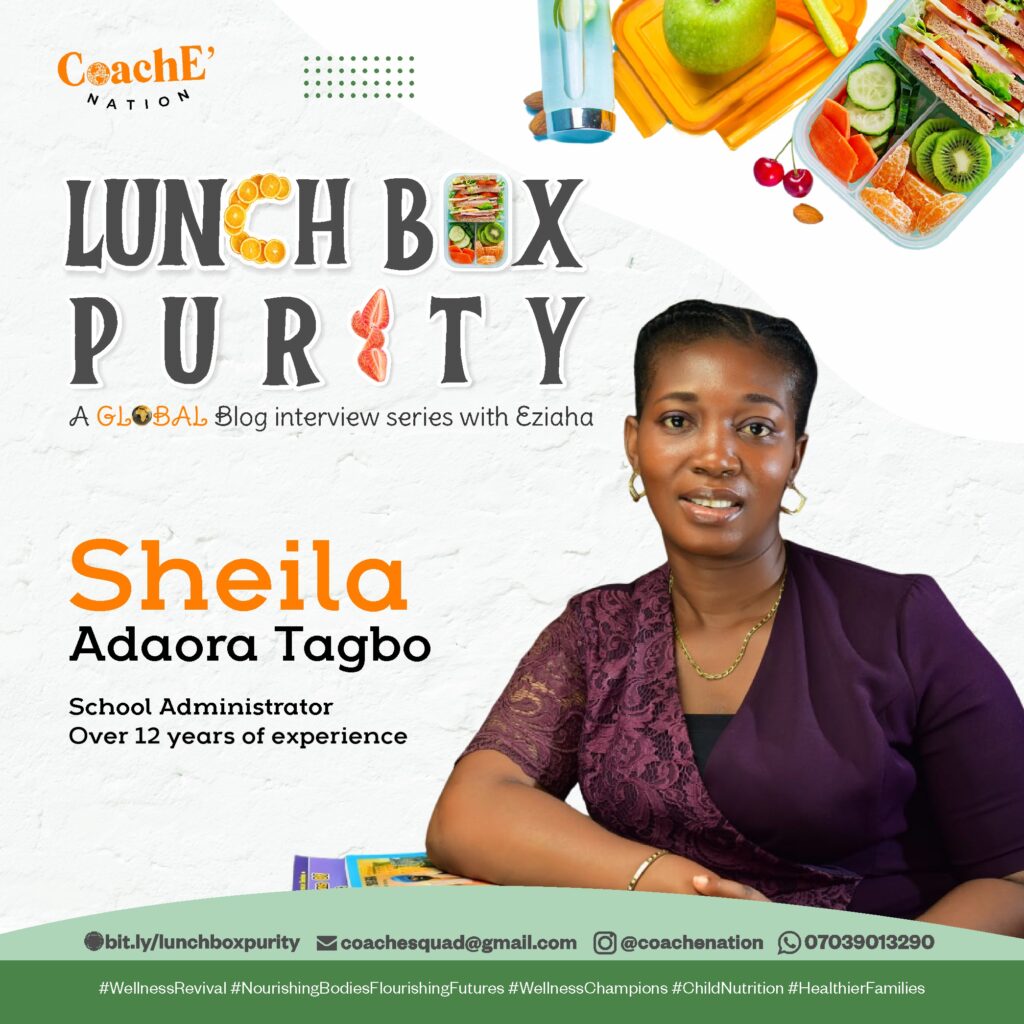
Please tell us your name, where you currently teach, years on the job and how you got into the beautiful world of education
Answer
It’s my pleasure to share my views on the LUNCH BOX PURITY BLOG SERIES. My name is Sheila Adaora Tagbo, a School Administrator with over 12 years of experience. I would say that the passion to mold lives and raise Godly children drew me into education. I’m of the opinion that my impact will be greater from within, hence my being an educator.
Your most significant/memorable experience as an Educator.
Answer
Being an educator has been fulfilling on all levels. Parents’ feedback on how our guidance has helped them navigate parenthood effortlessly will always be the crux of it. A parent said, and I quote, “I thank God for your guidance. You helped me conquer my fears when we joined the school. You have constantly shared experiences and nuggets on practical steps to take in becoming a better parent. Some of which are emphasizing the need to have family, ensuring the children are abreast of them, reducing screen time, setting rules and routine, and ensuring they follow it was the highest level for me.”
Is it actually possible for a school to eliminate completely junk in the lunch boxes of our children as opposed to having a few days a week where junk is not allowed? If no, why?
Answer
Yes, it is possible for a school to implement a policy that restricts or eliminates completely junk food from lunch boxes. Schools can establish clear guidelines for what types of food are allowed, encourage healthier options, and educate both pupils/students and parents on the importance of nutritious meals.
Also, collaborating with parents, providing meal plans, healthy alternatives in school cafeterias, and promoting sensitization programmes can contribute to creating a healthier food environment.
Have you ever been a part of a transitioning process in the school? By this, I mean where the school decides that we would have junk-free days a few times a week, or even junk-free days every day. If yes, how was that transition process and what was the outcome like? What impact did you see in the children? And if you were to help another school transition, what are the best practices you would recommend to make it seamless?
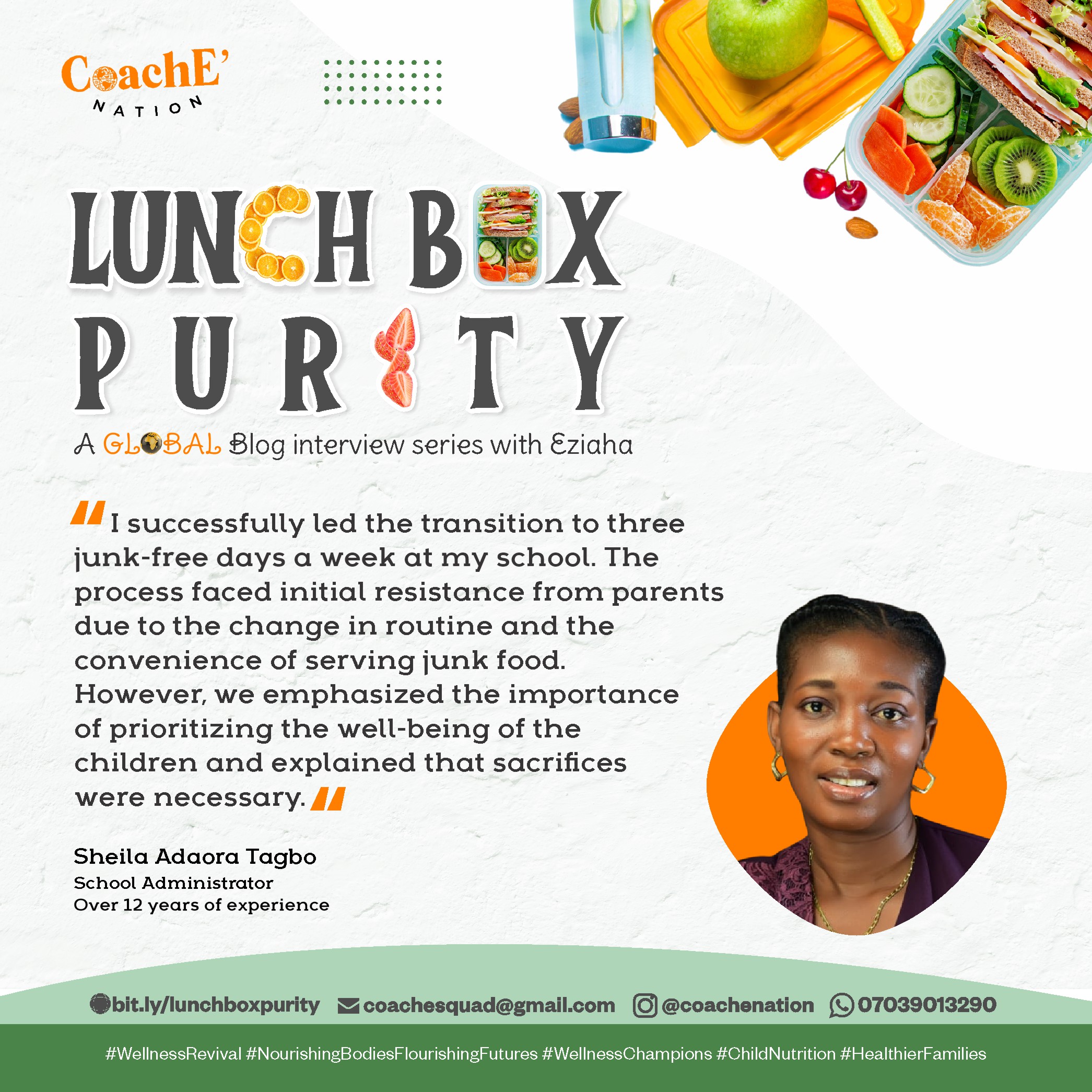
Answer
Yes, I successfully led the transition to three junk-free days a week at my school. The process faced initial resistance from parents due to the change in routine and the convenience of serving junk food. However, we emphasized the importance of prioritizing the well-being of the children and explained that sacrifices were necessary.
The feedback from parents has been positive, with many expressing gratitude. Our children rarely fall ill, and their immune systems have strengthened significantly.
When advising a start-up school, it’s crucial to establish clear junk-free guidelines, sensitize parents on the benefits, and enforce the policies consistently. For existing schools, implementing junk-free policies on selected days and educating parents about making nutritious choices can be a successful approach. Remember, what works for a start-up may not necessarily work for an established school, so tailoring the strategy is essential.
Are there times when an Educator (you or someone else) has had to intervene per the content of a child’s lunch box, especially when you can see that the frequency and volume can negatively impact on the child’s health both short term and especially long term? If yes, how did that go and/or how can an Educator help/intervene without coming across as being judgmental? How do we educate that child and/or the parent into better and healthier decisions?

Answer
As a school administrator, I have actively intervened in the frequency and volume of food that some of our pupils bring to school. In my role as their loco parentis, I am intentional about the overall well-being of the children under my care. In these cases, I emphasized the school’s interest in promoting a healthy environment and suggested collaborative efforts to encourage nutritious meals. I proposed exploring the services of the school cafeteria as healthy meals are served daily or sharing meal plans with parents, recognizing the challenges they face in deciding what to prepare daily. Additionally, I highlighted the positive impact of proper nutrition on their children’s well-being.
What role can parents play in supporting your effort to promote healthy eating? How best should we communicate with parents about the importance of nutritious lunches? Do you have any practical success stories on this?
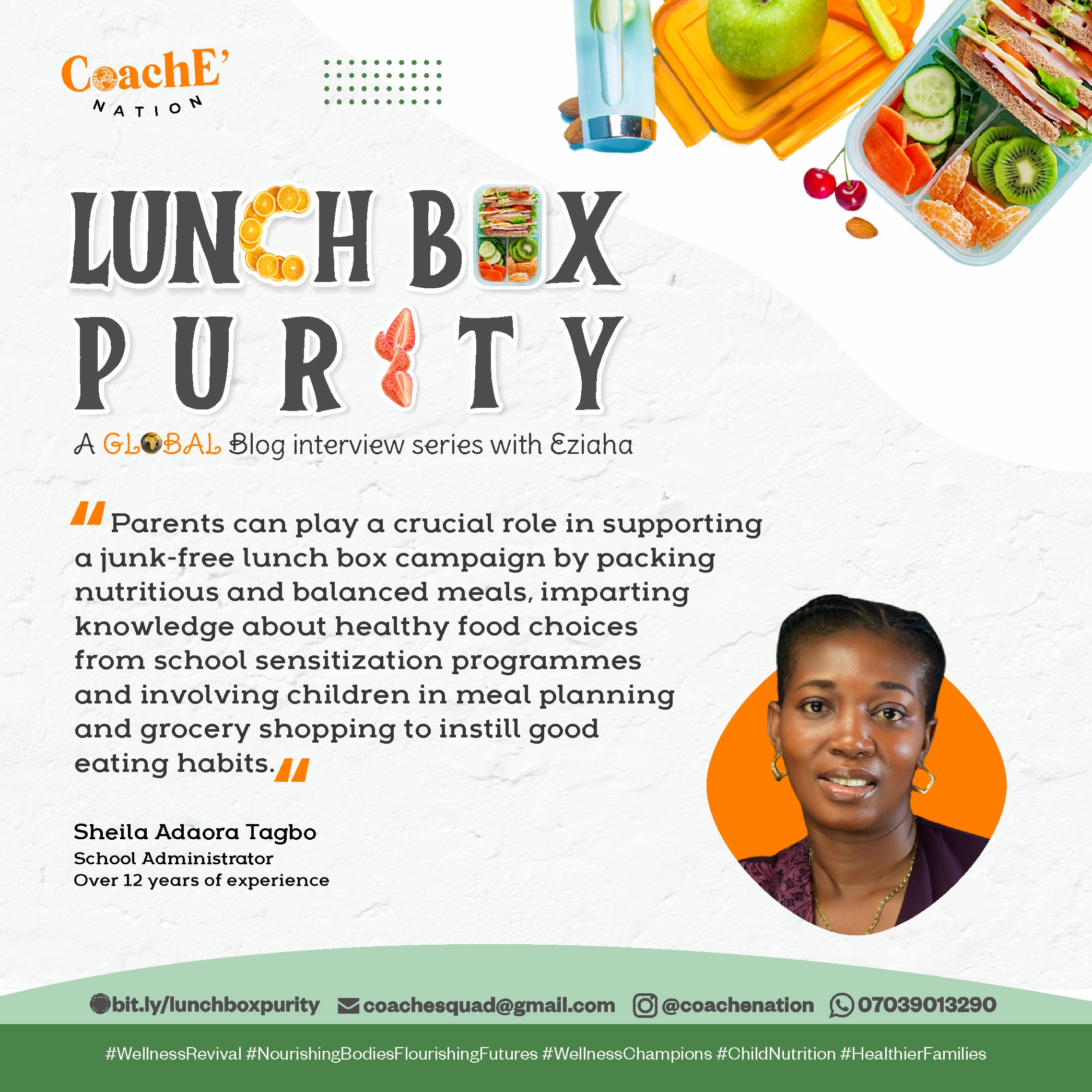
Answer
Absolutely! Parents can play a crucial role in supporting a junk-free lunch box campaign by packing nutritious and balanced meals, imparting knowledge about healthy food choices from school sensitization programmes and involving children in meal planning and grocery shopping to instill good eating habits
How can the Government, Federal or state, throw their weight behind schools (in terms of policies for example) in the fight to ensure that at least within schools, child nutrition is front and centre!
Answer
Governments can support child nutrition in schools by implementing and enforcing policies that prioritize healthy food options, promote nutrition education, allocate funding for school meal programmes, and collaborate with stakeholders like schools, parents and health professionals to create comprehensive strategies for ensuring children’s well-being.
Do you have any cool stories on how a child’s diet can directly impact learning and contribute to creating a more conducive learning environment for students? How does what a child eat for breakfast and at lunch, snacks inclusive, affect how they show up in the classroom?
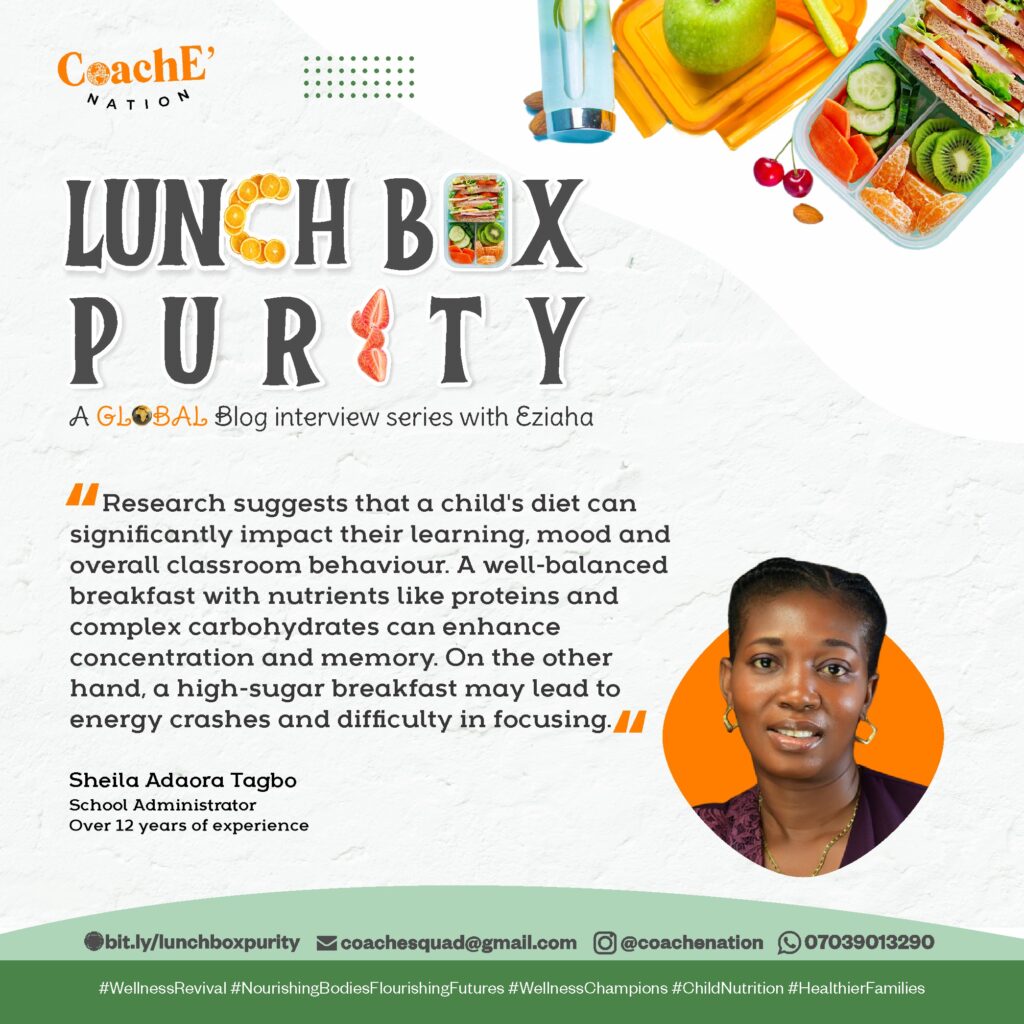
Answer
Certainly! Research suggests that a child’s diet can significantly impact their learning, mood and overall classroom behaviour. A well-balanced breakfast with nutrients like proteins and complex carbohydrates can enhance concentration and memory. On the other hand, a high-sugar breakfast may lead to energy crashes and difficulty in focusing.
Similarly, lunch and snacks that include a variety of nutrients, especially omega-3 fatty acids and antioxidants, have been linked to improved cognitive function. Foods rich in these elements support brain health and may positively influence a child’s ability to learn and engage in the classroom.
Consistent, nutritious meals can contribute to stabilized energy levels, better mood regulation, and sustained attention throughout the school day, creating a more conducive learning environment for pupils.
Case study: “Sidney** begins each day with so much energy, but lacks concentration,
affecting other children in class. His academic performance has declined significantly. During
a meeting with the parents, we discovered that the breakfast options—fizzy drink and toast
bread—were not ideal as they made him hyper and unable to concentrate.
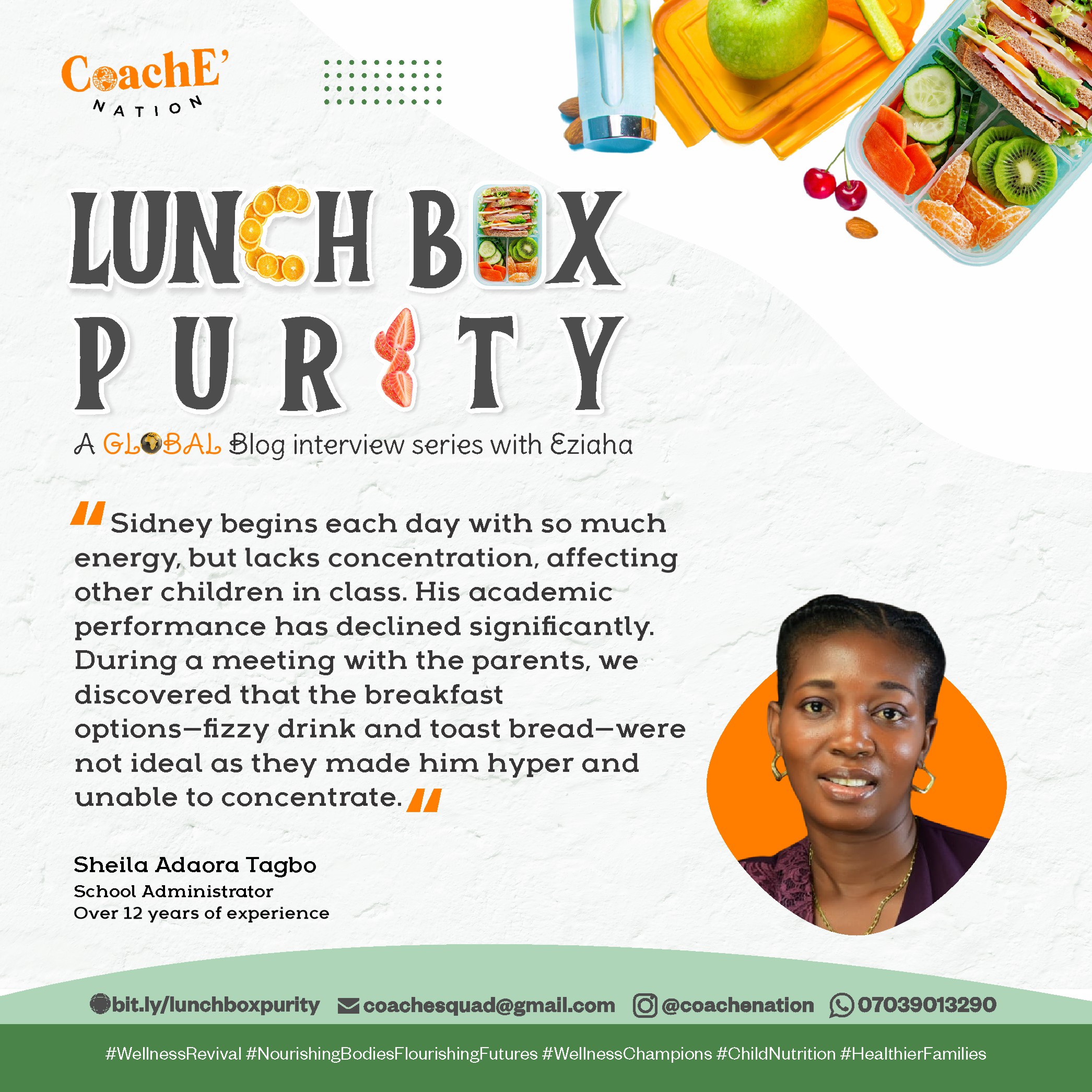
The school intervened by providing easy and fast-preparing balanced breakfast meal plans, which proved to be very helpful.” It improved the child’s concentration, memory, and mood, reducing restlessness, resulted to better academic performance and overall behaviour in school.
If you are a special needs Educator, what have you noticed about the impact of food and a
child’s ability to learn or otherwise? Do you have any experiences to share?
Answer
As an administrator in an inclusive school, I strongly believe that diet can significantly impact the learning abilities of children with special needs. For instance, a balanced and nutritious diet supports cognitive development, while deficiencies in essential nutrients may hinder learning. Omega-3 fatty acids found in fish can enhance brain function, while excess sugar might contribute to attention issues. Individualized nutrition plans can play a crucial role in supporting the unique needs of children with conditions like ADHD or autism. I always advise parents to consult with health care professionals for personalized guidance.
Are there ways you have successfully incorporated Nutrition education into your curriculum? Can you share any successful strategies you’ve used to make nutrition education engaging for children? This really speaks to it being incorporated into the learning curriculum as opposed to scheduled events.
Answer
We intentionally incorporated healthy living into the school’s curriculum. Topics such as a balanced diet, food classes, and the significance of each class, along with the effects of not maintaining a healthy diet, are taught to instill good eating habits and culture in our pupils.
Additionally, we regularly involve the Year 6 pupils only in culinary events focused on healthy
meals and recently, we have extended this initiative to the entire upper primary classes.
….…………………………………….
Whoosh! Mrs Tagbo definitely took us to school on this one like I said. I even learned a new word which I had to google – in loco parentis which means acting in the place of the parents. I am feeling super educated right now and deeply reinforced in my belief that schools and educators are such an important and ‘quick action’ part of creating junk-free lunch boxes, in collaboration with parents. While Government interventions that are effectively enforced and followed up, can be a major game changer, they can take time to actually be passed, but in schools, 1-2-3 and a whole junk-free policy can be created TOMORROW!
I especially love her insight and wisdom on start-ups and established schools. I definitely agree with her that start up schools should insist on a junk-free policy from the start instead of having to recall a train that already left the station. Trust me, they won’t miss nothing! However, even established schools can reverse and start all over on a healthier slate, and interestingly, one of our Educators implemented this in her school recently as they went completely junk-free!
So many ‘quick actionable’ steps in this blog and if you are a Mom or Educator reading this, I want to hear from you… What ‘quick action’ are you taking as a result of all we have learned?
Drop a comment and there will be other parents and Educators reading the comments with
the wisdom that we all have to share, so share please! I would really love to hear from you!

Next week Monday, we go again! Please support and spread the WORD that the LUNCH
BOX PURITY blog series is LIVE!
You can create your own customized flier here and then share the link to the amazing Parents and Educators in your circle.
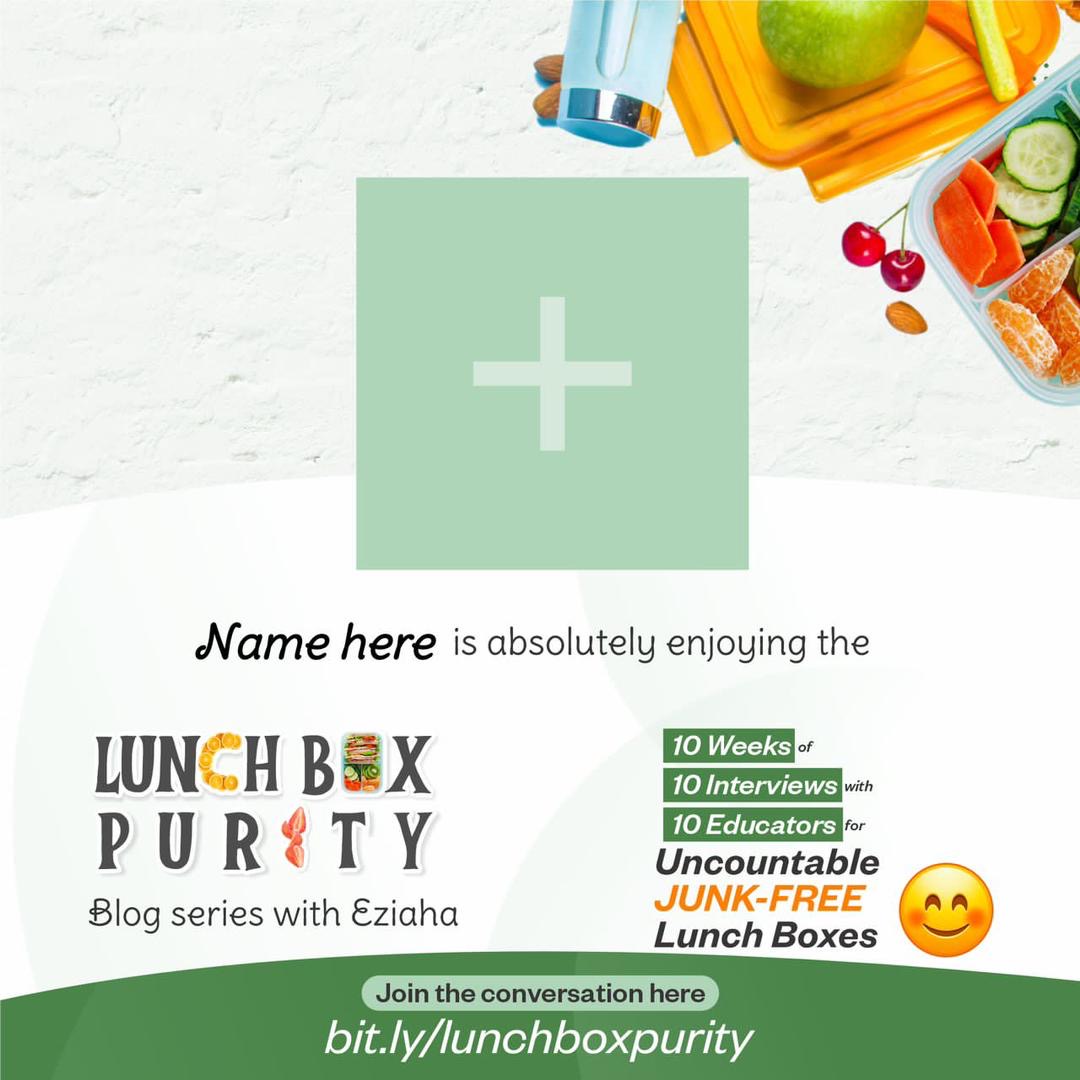
Listen, I know some of you reading this are like I NEED HELP please. I truly want to do better but I don’t even know how to start.
I got ya! I have so many resources, including free ones to help!
Like that piece on Brighton shows, we need to educate and sensitize more parents. Which is
why we have the NOURISH-FLOURISH Moms club.

Details about the Club can be found HERE so if you need some hand-holding, jump on board the next one. The first one is currently underway and has been hugely impactful for the Moms who joined in
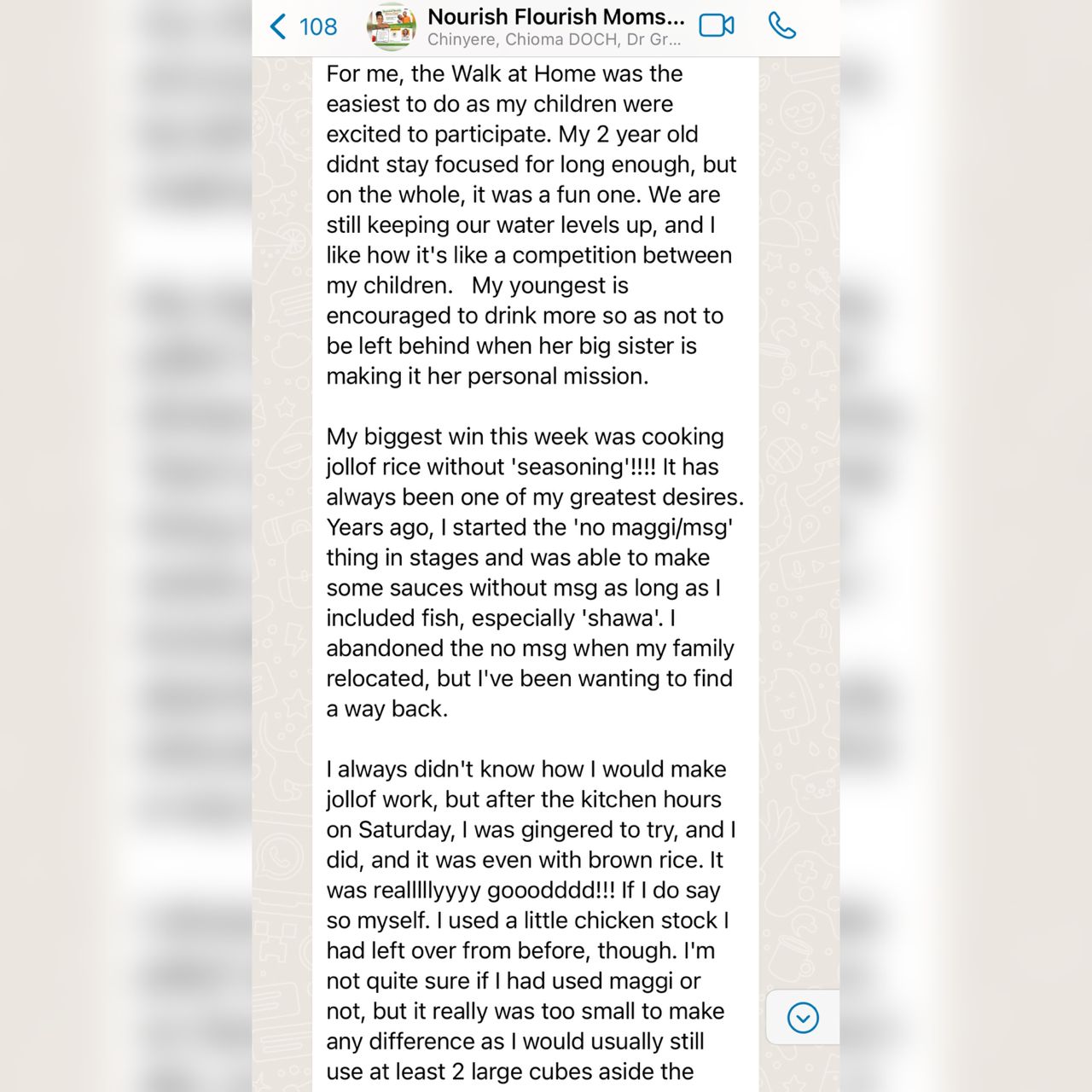

Then catch my TVC interview series every Wednesday on the WAKE UP NIGERIA show here and here My Channels Child Nutrition feature is also here

I also hosted a 2-day Wellness Revival in November 2023, where we went deeeeeeep with professionals, Moms and other Influencers talking about Child Nutrition. You can catch access to both days here

Listen, as you can see and tell, I am COMPLETELY IN with this Child Nutrition message. In any and every way I am able to, I am committed to getting the message OUT. Our kids don’t have to be victims of whatever Health crisis is on the horizon. And yes, my book, WELLNESS CHAMPIONS also launches in June 2024, on my birthday so look out for that one!
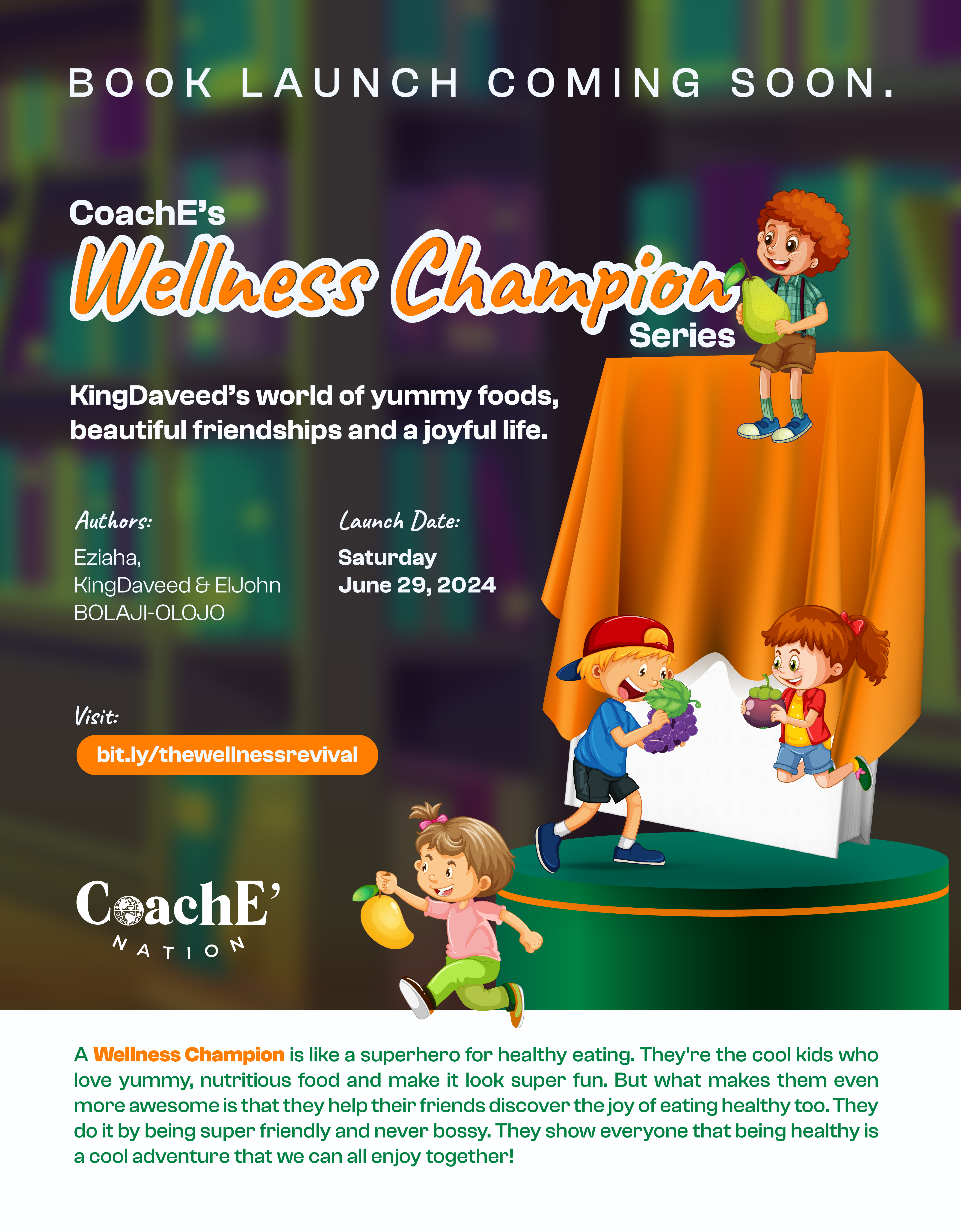
Ok, see you next Monday with our Super star Educator talking LUNCH BOX PURITY!
With all my HEALTHY Love!
Eziaha,
Wellness Revivalist and Lunch Box Purity
PS
Healthy Moms raise Wellness Champions! Need to get healthier as a Mom? Or Mom-to-be?
Our JOYFUL weight loss squads are the best place to be, especially if FOREVER RESULTS
is your goal!

And if you prefer a PRIVATE coaching experience, then let’s work together to get everyone
and yourself to go WOW

PPS
Follow me on my brand new IG here after being away for over four years, and on LinkedIn
here. My YouTube channels is value-choked and you can join that family here


